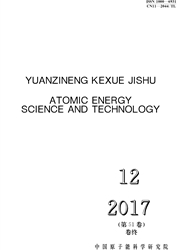

 中文摘要:
中文摘要:
随着分离式热管不断被提出用于核电站非能动余热排出方案中,开展针对大尺度分离式热管的换热性能的实验研究变得日益迫切。为此,本文开展了以R134a为工质的304不锈钢材质的分离式热管传热特性实验研究,获得了热管整体换热性能、蒸发段内部温度分布特性,以及热源温度和冷凝段外风速对热管工作温度、换热量、换热系数和循环流量的影响。热管蒸发段内R134a经历过冷、两相和过热状态,其中两相区域较长,达6.6m,因而具有较好的换热能力,在所研究的工况下换热量最高达21kW。参数敏感性分析表明,热源入口温度和冷凝段风速的增大能促进热管的换热性能,特别是热源入口温度的影响更显著。冷凝段风速较小时,其对换热量的影响较为显著,然而随空气速度的增加,影响降低。此外,依据试验数据拟合得到了换热量与冷热源温差的经验关系式,能在工程应用中快速预测热管的性能。
 英文摘要:
英文摘要:
The large-scale separating type heat pipe has been proposed to replace the active cooling system for passively removing residual heat from nuclear power plant,and experiment studies on such system become imperative.The experiment study on heat pipe made of the stainless steel 304 was carried out using R134 aas the working fluid.The thermal performance(the heat transfer rate)and the temperature distribution inside the evaporator section were obtained.Furthermore,the effects of the hot water temperature at the inlet and the air velocity outside the condenser section on the operation temperature,heat transfer rate,heat transfer coefficient and flow rate of R134 awere analyzed.The results show that the sub-cooled R134 a entering the evaporator sectionevaporates and finally is overheated.The two-phase region as long as 6.6mdominates the evaporator to ascertain the good heat transfer performance of the heat pipe.The maximum heat transfer rate is as high as 21 kW.Parametric analysis shows that the heat transfer is improved by the increase of hot water inlet temperature and the air velocity.The effect of hot water inlet temperature is more significant compared with the air velocity.The effect of the air velocity is obvious when it is small.As the air velocity increases,the increase of the heat transfer rate declines.To quickly predict the heat pipe performance for the design in the engineering,the correlation between the heat transfer rate and the average hot water and air temperature difference is developed.
 同期刊论文项目
同期刊论文项目
 同项目期刊论文
同项目期刊论文
 期刊信息
期刊信息
